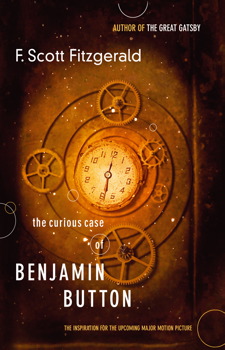We all know F. Scott Fitzgerald as the author of the American classic The Great Gatsby, among other works of realistic fiction with biting social commentary. What you may not know is that he dabbled in magical realism! The genre has flourished in recent years with works from authors such as Jorge Luis Borges, Laura Esquivel, and Nobel Laureate Gabriel García Márquez becoming bestsellers and book club favorites.Who would have thought Fitzgerald had explored the genre in 1922!
His short story, “The Curious Case of Benjamin Button,” is the brief story of a man’s life. An unremarkable life, mostly, except for the astounding fact that he ages backwards. Benjamin is born to parents who are wealthy, well connected, and held in high regard in antebellum Baltimore society. When their first child is born, they are extremely dismayed to find that he is not a normal baby at all, but a small, crouched old man, apparently about eighty years of age. They are mortified and concerned for their social position, but they do their best to raise Benjamin like a “normal” boy, dying his white hair black and sending him to kindergarten like the rest of the children. As he advances in years, he grows stronger and younger, eventually marrying and taking over a business. In his old age, he has finally come full circle and is a small child being “raised” by his grown-up son, Roscoe.
This may seem like a huge departure for Fitzgerald and in many ways, it is. But this thin volume has his stylistic and thematic fingerprints all over it. My favorite parts of the story are those where Benjamin’s friends and family comment on his “condition.” His parents, more than being alarmed about the implications to their son’s health and well-being, are immediately and continuously worried for their social position and how the “scandal” of Benjamin’s reverse aging could affect their place in high society. His wife, whose beauty is fading as Benjamin’s virility and handsomeness are ever increasing, is particularly angered by him. During a quarrel, she says, “I should think you’d have enough pride to stop it . . . there’s a right way of doing things and a wrong way. If you’ve made up your mind to be different from everybody else, I don’t suppose I can stop you, but I really don’t think it is very considerate.” Towards the end of his life, Roscoe is fed up with raising his father and says, “you better turn right around and start back the other way . . . it isn’t funny any longer. You—you behave yourself!” The profound self-centeredness of these remarks and the obsessive concern over one’s position and appearances are central themes in all of Fitzgerald’s work, but are demonstrated here in a new and fantastical way.
Having a mundane week? Need a little bit of magic in your all-too-real world? I propose this: host a flash bookclub. Have your friends go out and buy this fifty-six-page volume on Monday, read it during the week (it will only take half an hour), and meet up on Saturday to discuss aging and social mores over a bottle of champagne. You could even make it a movie night with the 2008 David Fincher film that is (quite loosely) based on the story. Sounds like a classy and fun affair, no? Fitzgerald would highly approve.





